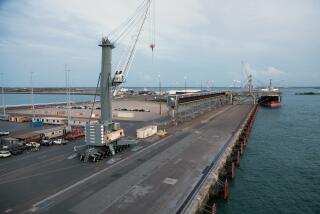Defending the Douglas Deal : Aerospace: The head of Douglas Aircraft tells a congressional hearing that the Taiwan firm buying 40% of the U.S. company will not become a rival using American technology.
- Share via
WASHINGTON — Douglas Aircraft President Robert Hood on Tuesday defended his company’s deal to sell 40% of its commercial operations to Taiwan Aerospace Corp., asserting at a congressional hearing that Taiwan probably will never turn the tables on McDonnell Douglas and become a rival using American technology.
“Once a final agreement for this alliance is reached, (Taiwan) is unlikely ever to become a competitor,” Hood told the Joint Economic Committee.
“As a partial owner of the new company, their viability will lie in making the enterprise successful,” said the chief of the Long Beach-based division. “There would be very little motivation for them to build a parallel, competing industry that would hurt their own market share.”
Moreover, Hood said McDonnell Douglas would be in control of the operation, able to determine the “destiny” of its Taiwanese partners--even though the company has acknowledged that without their $2 billion in cash, it would be unable to build its next generation jetliner, the MD-12.
But critics of the deal testified that the rationalizations for McDonnell’s foreign venture echo the words used to describe such arrangements in other troubled U.S. industries that eventually lost out badly to international competition--including steel, automobiles and semiconductors.
Clyde V. Prestowitz Jr., president of the Washington-based Economic Strategy Institute, said McDonnell and its U.S. competitor, Boeing Co., face “an impossible situation” in battling subsidized foreign aircraft firms.
U.S. industrial policy, he said, is being dictated from abroad--a case in which the winners will be picked by foreign governments. “In the long run, the winners will not be American,” he said.
Hood’s comments were McDonnell Douglas’ first comprehensive defense of the controversial transaction, which is seen by some members of Congress as the result of U.S. government neglect of the entire aerospace industry.
Sen. Jeff Bingaman (D-N.M.), who called Tuesday’s hearing as chairman of the subcommittee on technology and national security, said afterward that he “continues to be concerned about the long-term implications of the arrangement, particularly for subcontractors.”
Bingaman added: “We have had a history of ignoring the loss of U.S. manufacturing capability in one industry after another. This is just another example of a loss in a strategic industry.”
But David C. Mowery, a professor of business administration at UC Berkeley, said McDonnell’s Taiwan partnership is merely an extension of many U.S. foreign ventures in aerospace by such firms as General Electric, United Technologies’ Pratt & Whitney unit and Boeing.
“The go-it-alone approach in this industry is increasingly impossible,” Mowery said. “The consequences of McDonnell Douglas’ not entering this venture is more negative as far as employment in Long Beach and the United States is concerned than if they do enter the venture.”
Although the Taiwan deal might be good for McDonnell Douglas, small aerospace subcontractors are likely to feel only greater pressure on their business as both the military and commercial aircraft businesses decline or move abroad, according to other testimony Tuesday.
David Goodreau, president of Burbank-based Newman Machine Works, described how his family business--handed down through three generations--is facing increasingly difficult market conditions as its military markets dry up and U.S. aircraft builders increasingly turn to foreign parts suppliers.
“How are we going to ensure that . . . my sons can continue in this line of work?” Goodreau asked.
“Like McDonnell, we need help, too--and not money from foreign suppliers,” he added, asking that the U.S. government focus its policy on maintaining U.S. industrial leadership in aerospace.
Hood said that McDonnell Douglas will continue to purchase and produce cockpit electronics, landing gear and test equipment in the United States, among many other products. “It is not like we are abandoning” American industry, he added.
In a prepared statement submitted to the committee, Hood also said that the new joint venture with Taiwan will be “unencumbered by debt and outdated facilities.” It was unclear whether he was describing the firm’s Long Beach plant, but that facility is Douglas Aircraft’s oldest site.
Hood said that the $2-billion deal would have gone forward even if McDonnell Douglas had been granted the $1 billion in special financial assistance that Chairman John McDonnell sought earlier this year in a secret request to Defense Secretary Dick Cheney.
He was turned down.
More to Read
Inside the business of entertainment
The Wide Shot brings you news, analysis and insights on everything from streaming wars to production — and what it all means for the future.
You may occasionally receive promotional content from the Los Angeles Times.










